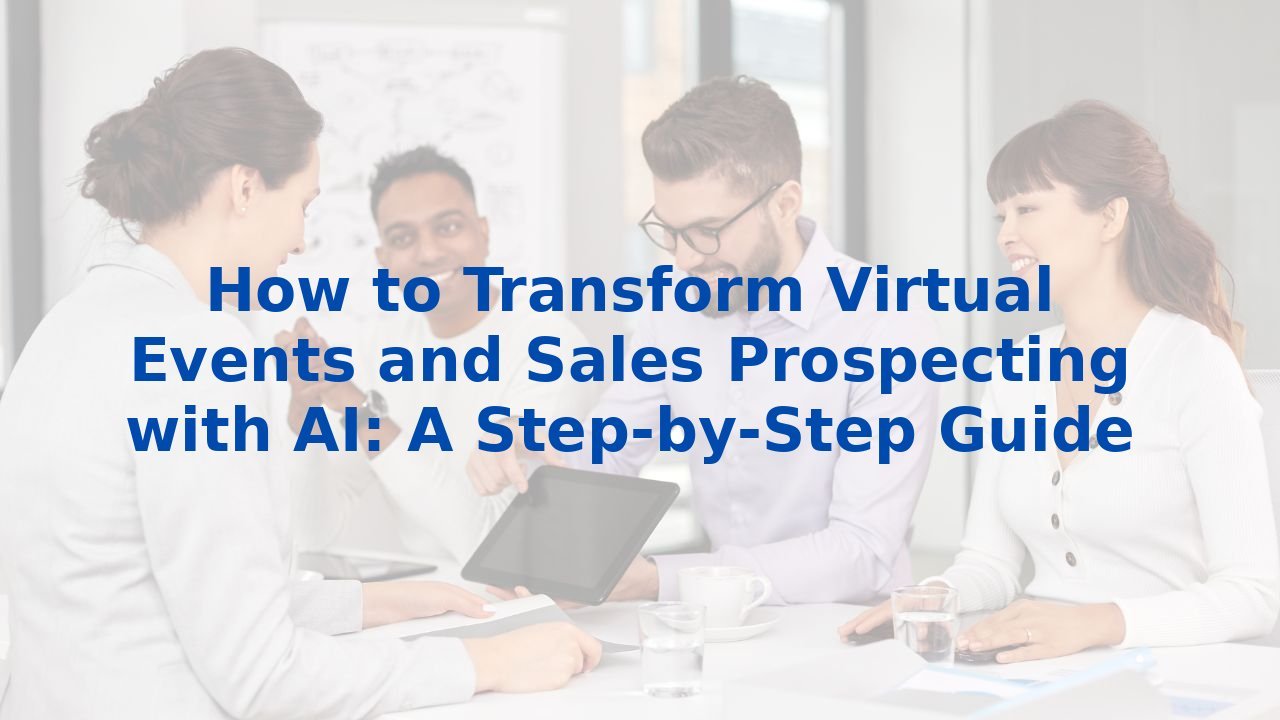How to Transform Virtual Events and Sales Prospecting with AI: A Step-by-Step Guide
How to Transform Virtual Events and Sales Prospecting with AI: A Step-by-Step Guide
Introduction
In our ever-evolving digital landscape, virtual events and sales prospecting have become essential components of modern business strategies. Yet, organizations often find these interactions to be less engaging than intended. The solution? Harnessing the potential of AI to enhance these processes. This guide explores how AI can transform virtual events and sales strategy, amplifying efficiency and elevating brand engagement in the process.
The Challenge of Virtual Events
Many organizations face a daunting challenge: virtual events often fall flat, lacking the interpersonal interactions that drive engagement. The issue frequently lies not with the technology itself, but with the roadmap underpinning these interactions. Also true for sales calls, if the strategy lacks clarity and resonance, the outcomes can be disappointing. The fundamental key? Understanding your audience's needs and preferences, then pivoting your approach accordingly.
Leveraging AI for Enhanced Engagement
AI holds the tremendous potential to elevate both virtual events and sales calls. Here are several avenues to consider:
- Personalization: Imagine discussing tailored content with participants who are genuinely interested. AI can analyze attendee preferences and behaviors, allowing for content that resonates personally. This ensures relevant information is not just delivered but is impactful.
- Interactive Elements: Engaging tools such as real-time polls and live Q&As can breathe life into a virtual event. AI can power these features, transforming passive viewers into active participants.
- Automated Summaries: Picture a world where post-call notes write themselves. Automated summaries can capture discussions, allowing teams to swiftly identify action items and reduce administrative overhead.
AI in Sales Prospecting
Prospecting can be one of the most tedious aspects of the sales process, yet AI emerges as a game-changer here as well:
- Data Analysis: AI excels at sifting through large datasets. By identifying potential leads and predicting their conversion likelihood, sales teams can prioritize high-value prospects, which ultimately leads to a more focused and efficient sales effort.
- Automated Outreach: AI streamlines the outreach process by automating personalized communications. This constant engagement ensures that potential leads feel valued, all without draining human resources.
- Chatbots and Virtual Assistants: When initial inquiries can be handled by AI-powered chatbots, sales staff can conserve their time and energy for deeper, high-stakes interactions, thus optimizing the sales process.
The Importance of AI Training
To harness the full potential of AI in transforming virtual events and sales prospecting, comprehensive training is non-negotiable.
- Tailored Learning Journeys: The diversity in roles within an organization dictates the need for specific training paths. Tailored learning programs ensure that employees can adeptly utilize AI tools relevant to their responsibilities.
- Generative AI Education: Understanding how to effectively prompt AI and deploy it responsibly is key. Learning these best practices can unlock deeper value from AI applications.
- Practical Applications: Training should not only be theoretical; it must encourage application in real-world scenarios. This practical approach is vital in recognizing potential use cases, resulting in seamless integration of AI tools into everyday operations.
Conclusion
Transforming virtual events and enhancing sales prospecting is within reach through the strategic leverage of AI. Personalization, engagement, and automation drive the effectiveness of these interactions, setting the stage for heightened brand awareness and conversions. Moreover, the journey doesn’t stop at implementation; ensuring employees are trained in AI tools is essential for unlocking long-term value. By adopting these strategies, organizations can navigate the complexities of the digital era and emerge stronger, fostering connections that transcend geographical boundaries.
“The future is not about what technology can do for us, but how effectively we can use it to connect, engage, and inspire.”



